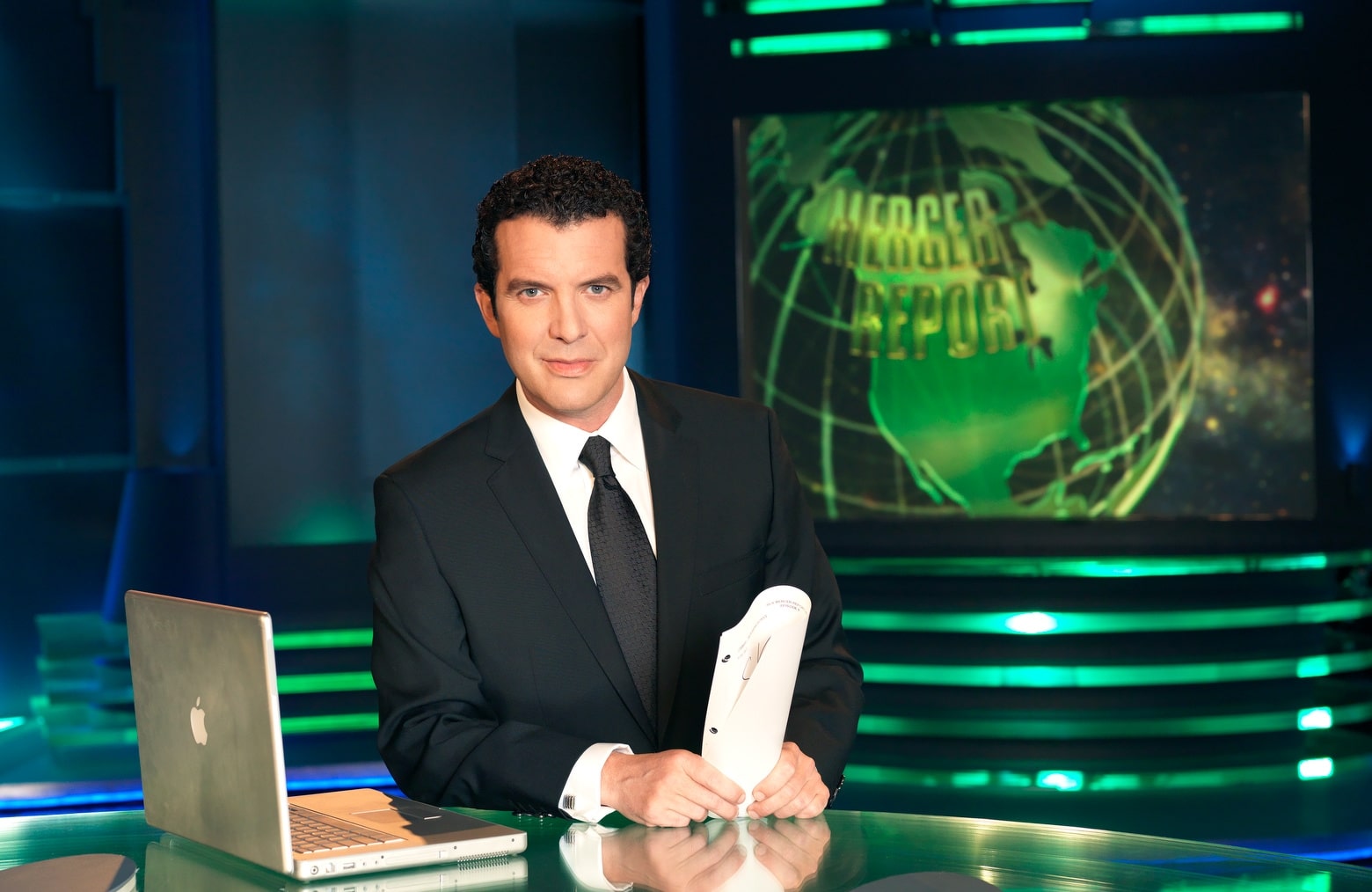“I have chairs. Do you want some chairs?”
Rick Mercer points to the studio floor, then looks at me expectantly with that famously arched eyebrow.
We are seated at his anchor desk in the 10th-floor studio at CBC’s Toronto headquarters. “I can sell you them for $20 each. After this week, they have to go.”
On Tuesday, after 15 seasons and 277 episodes, the perma-smirking host of the Rick Mercer Report will give his final, indignant rant before signing off.
It’s strange interviewing Mercer at the pulpit from which he addresses a still-healthy average of 971,000 viewers every week. Especially since Mercer, 48, is the one normally asking the questions. On this day, he’s not wearing his usual host outfit, a black suit, but his writer’s room garb of argyle sweater and jeans.
“It’s like being on a talk show!” he exclaims, rapping the Lucite table like an auctioneer. “This is our second desk. It’s got a few dings in it. But it’s still good.”
Mercer is not kidding about the chairs. They are owned by the independent production company he shares with business and life partner Gerald Lunz, which creates the CBC show. The taxpayer-funded bleachers squeaked. So 350 chairs were brought in for the studio audience. And now there are days left to go.
“Technically I’m gone by the end of the week. Well, I guess it depends on when Gerald and I lay each other off,” Mercer says. “We might give it another week.”
But he will perhaps best be remembered for introducing average Canadians to other Canadians. In a recent episode, for instance, Mercer travelled to Halifax to learn dance moves with the Maritime Bhangra Group, who had scored a viral hit last winter with a video of three men in T-shirts and turbans dancing with snow shovels.
Disparate and funny moments like these, capturing Canada at its best, are a large part of the show’s charm. Not surprisingly, asking Mercer what his favourite moment might be gives him pause.
“It’s really hard to say what were the best moments. Rick Hansen was a childhood hero for me. I did a project on him at school so to meet him was a huge thrill,” Mercer says. “But that’s if you’re talking about well-known people. Then Jean Chrétien and Jann Arden would be up there. But then there are so many other people who may be oyster fishermen or farmers or cops, who were special and made the show special. And then there were the adventures. Climbing some mountain. Starting an avalanche on purpose. They were all very different but just incredible experiences.”
The show defied conventions of television. It wasn’t quite news satire like The Daily Show, a travelogue like Rick Steeves: Europe, a sketch show like Air Farce nor a talk show like The Social.
To make it work, you needed someone with the prickliness of Jon Stewart, combined with the approachable persona of travelling weatherman Al Roker. The show found that in Mercer. Along the way, it picked up 12 Canadian Screen Awards and four Geminis.
But before he got there, Mercer broke into prominence on This Hour Has 22 Minutes. That’s where he began those weekly, in-your-face, often political rants.
22 Minutes ideally suited his acerbic skills, allowing him to speak truth to power. As in the time he asked then-presidential candidate George W. Bush what he thought of Prime Minister “Jean Poutine.” Bush, not catching the reference to Canada’s favourite fried food, replied that he wanted a strong relationship to Canada.
But the dynamic on Rick Mercer Report is markedly different. Here the joke is on Mercer himself, not the interviewee. It’s as if he intentionally took the bite out of his comedy chops to be more inclusive. And perhaps there couldn’t be anything more Canadian than that.
“In comedy, your natural instinct is to tear down. That’s because your first great laugh comes at the expense of your teacher. Then you go after the vice-principal. And that’s how it gets started. But we had a philosophy we called ‘We don’t s–t on Thunder Bay.’ If we go to Thunder Bay, it’s because it’s the greatest place on Earth,” Mercer says. “As a result, people welcomed me. They trusted me. They knew I wasn’t there to make them feel small. It was about celebration.”
I remind Mercer, a little uncomfortably, that in a 2014 review of what turned out to be a dismal CBC lineup, I suggested that they cancel the Rick Mercer Report. Of course, that would be the same year Mercer was appointed an officer of the Order of Canada by Governor General David Johnston for his “ability to inspire and challenge Canadians through humour.”
The criticism was not because I thought the host was untalented but that the format was restrictive. What would happen if, like former late-night cable host Jon Stewart, Mercer were able to fly unleashed from the confines of family-friendly public broadcasting?
“People always have a perception of what other people on TV should be doing, but I ended up doing exactly what I wanted to do, although I’m flattered you think I should be doing something else,” he says.
“We realized very quickly we were a family show. We didn’t start out that way, but we did change the tone as a result. When you’re on TV, you want to be on prime time. I embraced the restrictions. It’s never been a mission of mine to say ‘f–k you’ at 8 p.m.”
Mercer is leaving at a critical time in the business. CBC has just named its new president, Catherine Tait, who formerly headed Salter Street Films, with a stable that included This Hour Has 22 Minutes. And like fellow comic Stewart, who left his show just as President Donald Trump arrived on the scene, Mercer is leaving CBC when Ontario could potentially have a Premier Doug Ford, the brother of controversial former Toronto mayor Rob Ford.
“I have never wished ill on my country to make my job easier,” Mercer says, laughing. “If Doug Ford does become premier and it results in chaos, I would only wish for good government. But I am really hoping it will be without the chaos part.”
Mercer says there was no “singular” moment that caused him to wrap the show. “In show business the show almost always ends the same way. You show up at work and your pass doesn’t work, and your stuff is in a box in the corner. The only thing that could damage our legacy is if we stuck around too long.”
He says he has projects on the go and a second book of his rants to be released, but he won’t divulge more.
“I don’t want to be that guy that says he’s doing all this stuff and then nothing happens. I have big plans and a ton of projects, but I just don’t know exactly. It was tough to do other things, but nobody put a gun to my head and said you have to be in two different places in Canada every week and a commentary. But the show had become all-encompassing, but that is the nature of the beast.”
Strangely, in all his rants, which have ranged from the need for regulation on social media to the asbestos-ridden money pit of the prime minister’s residence, Mercer has avoided talking about public broadcasting.
“I think it’s mainly because I am on the public broadcaster so people would have to take that with a grain of salt,” he says. “But when I leave I will be a strong advocate. I think there is a need for a strong CBC.”
And for someone who invites himself into the homes of Canadians, he has always been protective of his privacy and, in his early years, his sexuality. He has been with Lunz, who also serves as executive producer on the show, since 1990.
“There might have been some nervousness on my part in an earlier life, the idea that you might not sell tickets in certain venues. And when I was out there promoting the shows I didn’t want to take things sideways with a discussion of my personal life,” Mercer says. “But it’s never really been an issue. But when someone asks me what car are you driving, now that’s getting personal.”
On this weekday, Mercer arrived at his windowless office at 9 a.m. to work on his final rant. It will be filmed in the graffiti-filled back alley off of Queen St. W. that is now the site of TripAdvisor-reviewed walking tours for fans of the show. This will be his 263rd rant, for which some statistician has figured he has walked 42 kilometres.
“I’m going to try to be reflective. But maybe not too reflective,” Mercer says. “This is a comedy show after all.”
Perhaps what I will miss most are his sketches, most of them ripped from the headlines. They were often sharp, with writing more polished and biting than the Emmy-winning minds, budget and star power of shows such as Saturday Night Live.
On recent episodes, there was Mercer in 2094 cancelling his cable provider because decades into the future people will still be switching between Rogers and Bell. Or Bombardier technicians shovelling money to be burned in an airplane engine because they’ve been “engineering the taxpayer out of money since 1942.”
We have had Mercer to thank for taking the piss out of the high and mighty. And also for making Canada a smaller, more intimate place.
“What I’ve admired more than anything are shows that go out on our own terms and I think we’re doing that,” Mercer says. “And seriously, the chairs. They have to go.”

